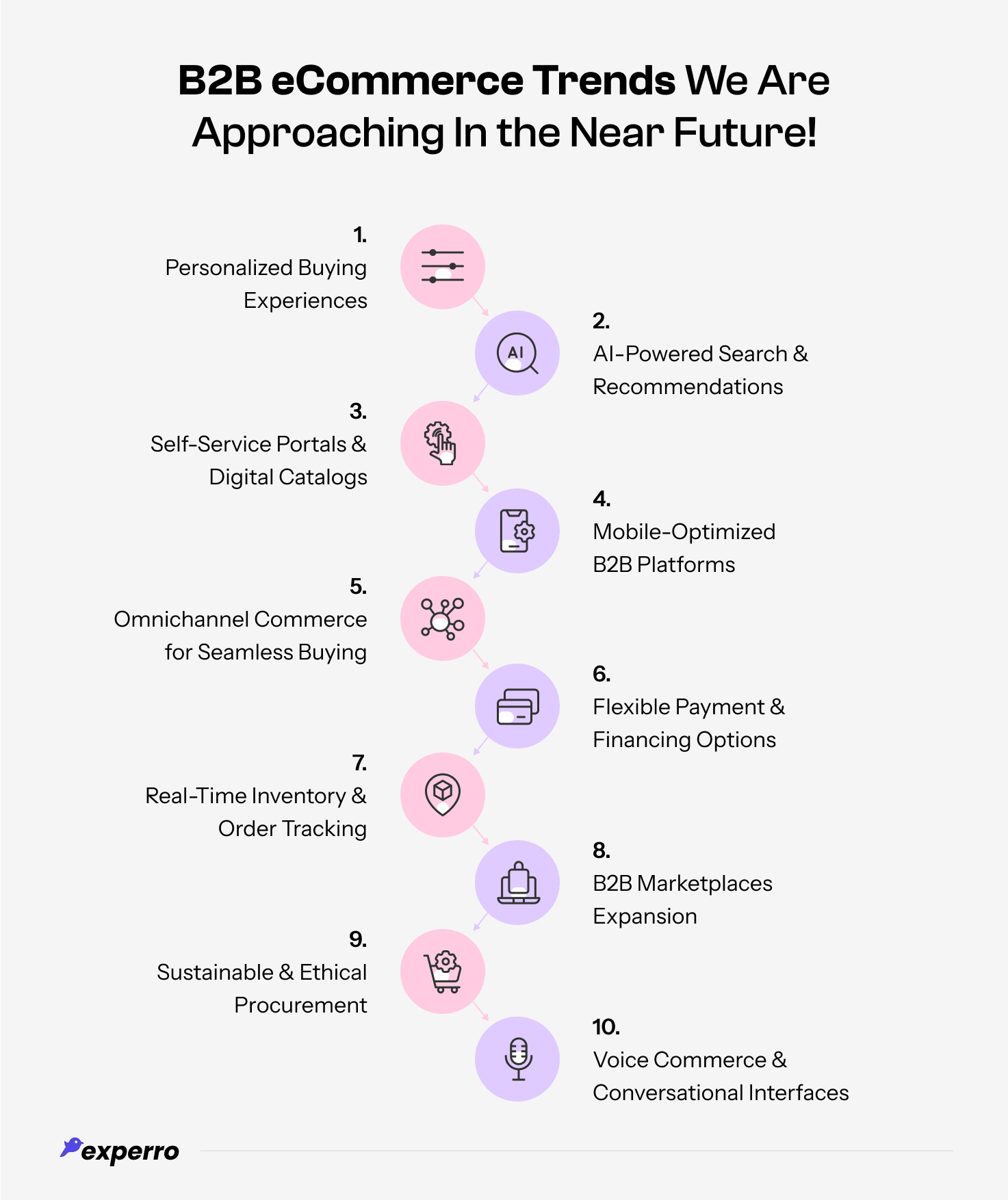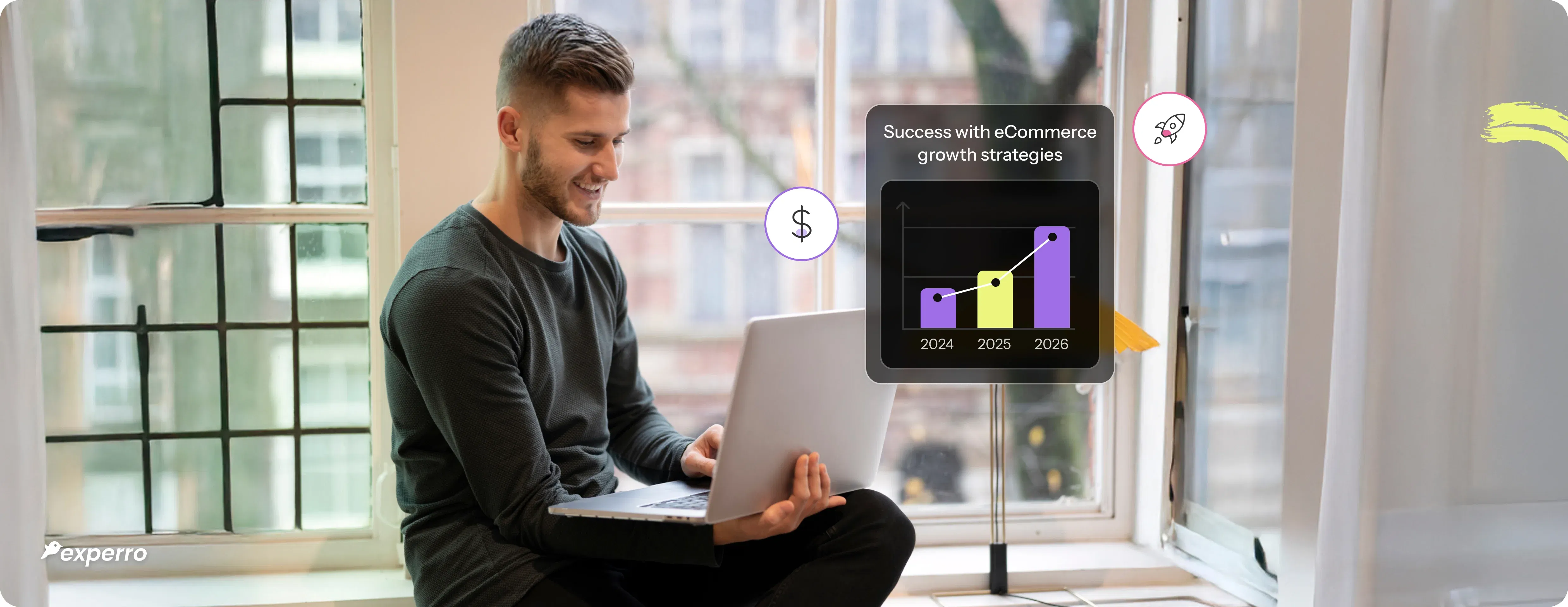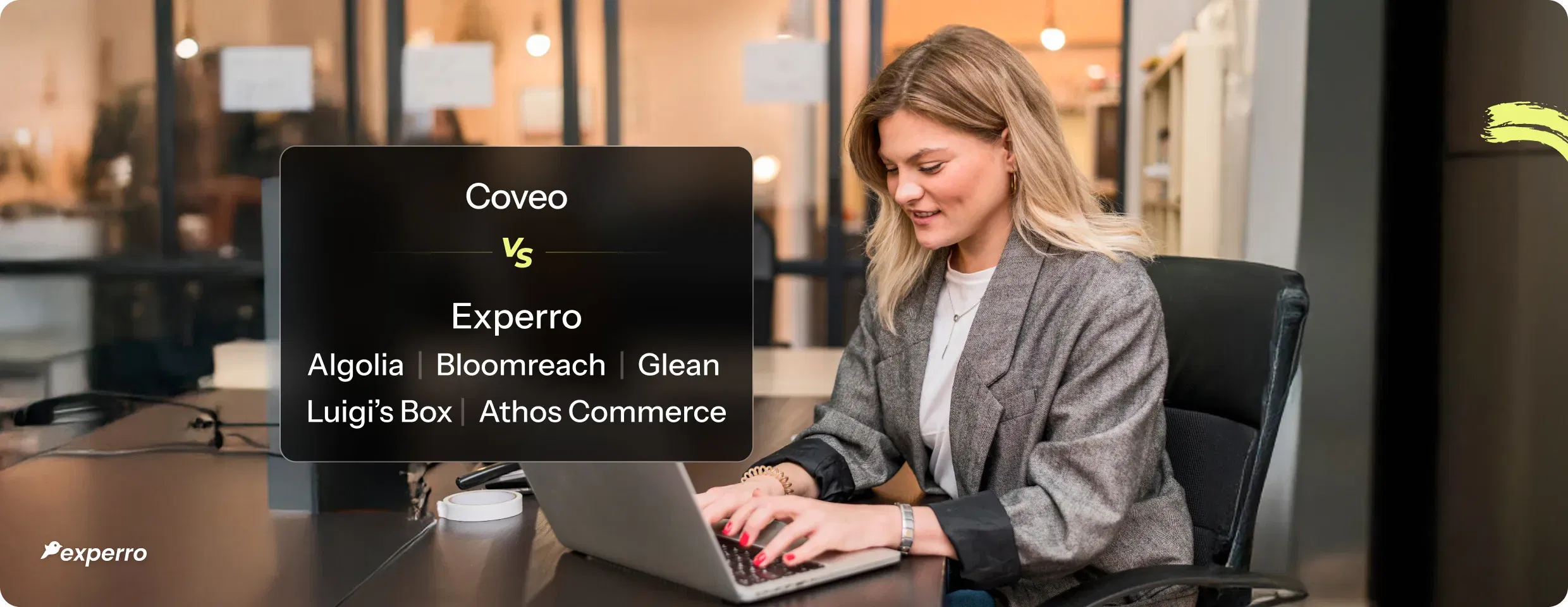core insights box
- The biggest B2B eCommerce trends highlight a shift toward AI, personalization, and data-driven selling across digital storefronts.
- Today’s B2B buyers expect speed, accuracy, and seamless journeys across devices - no matter how complex the catalog.
- Experro supports faster, more accurate B2B product discovery with AI, helping you respond to changing B2B eCommerce trends.
Is your B2B eCommerce strategy built for what’s next?
The way businesses buy and sell is changing quickly. With shifting buyer expectations, emerging tech, and a growing demand for efficiency, staying updated is no longer a choice.
In this blog, we explore the latest B2B eCommerce trends 2025 that are shaping how companies engage, convert, and grow.
Whether you're scaling or transforming, these insights will help you plan for the future. Now, let’s jump into the key trends in B2B eCommerce.
10 B2B eCommerce Future Trends to Adopt If Not Already!
The B2B industry is evolving rapidly. Companies that adapt early will be the ones who lead. Here are the key B2B eCommerce trends:
- Personalized Buying Experiences
- AI-Powered Search and Recommendations
- Self-Service Portals and Digital Catalogs
- Mobile-Optimized B2B Platforms
- Omnichannel Commerce for Seamless Buying
- Flexible Payment and Financing Options
- Real-Time Inventory and Order Tracking
- B2B Marketplaces Expansion
- Sustainable and Ethical Procurement
- Voice Commerce and Conversational Interfaces

Below are the top B2B eCommerce trends in detail, defining how businesses will operate in the coming years.
1. Personalized Buying Experiences
Today’s buyers want more than just transactions. They want relevance. A personalized B2B shopping experience delivers custom product catalogs, dynamic pricing, and tailored promotions based on previous behavior or company type.
This trend is central to the shift in B2B buying journey, improving engagement and accelerating decision-making.
As competition grows, Gen AI in personalization will be the key to building trust and long-term relationships.
2. AI-Powered Search and Recommendations
Artificial intelligence and machine learning are redefining the buyer journey by making search faster and smarter. AI-powered engines deliver results based on context, behavior, and preferences. B2B eCommerce search improves data accuracy and product discoverability.
With Gen AI in B2B eCommerce, businesses are enabling predictive suggestions and intelligent cross-selling. This shortens the path to purchase and also enhances the customer experience.
As part of B2B eCommerce innovations, AI is becoming essential for scaling product discovery.
3. Self-Service Portals and Digital Catalogs
B2B buyers expect autonomy and efficiency. Self-service platforms with digital catalog management allow them to research products, generate quotes, and place orders without needing a sales representative.
This empowers decision-makers and reduces manual overhead for businesses. As one of the current trends in B2B eCommerce, self-service tools help speed up purchasing cycles and improve customer satisfaction.
They’re now a must-have for any next-gen B2B eCommerce platform.
4. Mobile-Optimized B2B Platforms
Mobile is no longer just a convenience. It’s a necessity. Buyers want to browse, compare, and order from their phones.
This has made mobile responsiveness one of the most crucial B2B website trends. Companies optimizing their platforms for mobile are seeing improved engagement and higher conversions.
As part of the future of B2B eCommerce, mobile-first eCommerce website experiences have become the standard, not an exception.
5. Omnichannel Commerce for Seamless Buying
B2B buying happens across multiple touchpoints, such as websites, emails, sales reps, and trade shows. An omnichannel B2B marketplace ensures a seamless experience across all these channels.
Buyers can pick up where they left off, regardless of platform. Omnichannel eCommerce is an integrated journey that boosts brand credibility and reduces friction.
It's a defining element of the B2B commerce evolution, making omnichannel one of the most impactful B2B digital trends.
Want to turn complex catalogs into simple choices for shoppers!
Help your buyers find the right products faster with Experro’s enterprise B2B Discovery solution!
6. Flexible Payment and Financing Options
Modern buyers want payment flexibility like credit terms, partial payments, and subscriptions.
Businesses that offer this make it easier for buyers to commit, especially for high-value orders. Supporting multiple payment options also reflects changing B2B sales trends, where convenience and control play a vital role.
This trend is reshaping how transactions will happen in the future of B2B online buying process.
7. Real-Time Inventory and Order Tracking
Buyers want full visibility into stock and order statuses. Real-time stock availability updates and order tracking improve transparency, reduce support inquiries, and build buyer trust.
This capability is especially important in complex supply chains. As part of the future of B2B technology, inventory visibility will define operational efficiency.
It’s also a major focus in B2B eCommerce industry trends for 2025.
8. B2B Marketplaces Expansion
Marketplaces are opening up new avenues for B2B sellers. From niche vertical platforms to global trade hubs, B2B marketplace trends are driving increased visibility and scalability.
Buyers benefit from broader choices and competitive pricing. Sellers gain access to larger audiences.
The U.S. B2B eCommerce market is expected to grow at a compound annual growth rate (CAGR) of about 18.4% from 2024 to 2030, reaching over $3.57 trillion by 2030.
By 2030, U.S. B2B eCommerce will surpass $3.57 trillion, proving the future of B2B eCommerce is set for rapid growth.
With innovations like ChatGPT instant checkout, B2B sellers can streamline purchasing and enhance buyer experiences, keeping pace with this rapid market growth.
9. Sustainable and Ethical Procurement
Environmental and ethical concerns are influencing purchasing decisions. Buyers now prioritize suppliers that demonstrate sustainability, fair sourcing, and compliance.
This shift is not just about values; it also reduces long-term risk. As part of the emerging trends, recent B2B eCommerce statistics show sustainable procurement is gaining ground and is expected to become a core purchasing criterion.
Companies that invest in eco-friendly practices can also strengthen their brand reputation and customer loyalty.
10. Voice Commerce and Conversational Interfaces
Voice-enabled ordering and conversational search are entering B2B technology trends. These tools make the buying process faster and more intuitive.
The rise of AI and natural language processing, businesses are tapping into the future of B2B sales trends using voice-based search and chatbots.
This innovation makes procurement more accessible and efficient. It also enables faster reordering and on-the-go interactions for busy procurement teams.
Experro helps B2B brands boost conversions!
Don't believe us? Witness it in a demo!
Why Leading B2B Brands Choose Experro?

Experro helps businesses move faster by enabling smarter, more efficient B2B purchasing journeys. By helping buyers find the right products faster, it removes friction from the purchasing process and drives better conversions.
Built for modern B2B product discovery, the platform understands complex queries, navigates large catalogs with ease, and delivers precise, relevant results every time.
Whether your buyers are new or returning, Experro ensures they experience a fast, intuitive, and personalized path to purchase. It reduces decision fatigue and keeps procurement efficient, even for high-volume or bulk ordering scenarios.
As the future of B2B eCommerce 2025 demands speed, accuracy, and adaptability, Experro equips your storefront to meet those expectations head-on.
Conclusion
The future of B2B eCommerce is driven by personalization, automation, and smarter digital experiences. Businesses that embrace these trends will not only grow; they will lead.
From AI-powered tools to mobile-first digital strategies, these innovations are reshaping how B2B transactions happen. What’s next for B2B commerce is already taking shape, as B2B predictions 2025 and beyond continue to unfold, staying ahead means acting now.
Ready to future-proof your B2B commerce? Schedule a call with our experts to learn about the latest B2B innovations.
FAQs
Why are personalized experiences important in B2B sales?
Personalized experiences are crucial in B2B sales because buyers have different needs based on industry, role, and use case, personalization makes the buying experience more relevant and efficient.
It reduces decision time and increases satisfaction, making it a key factor in today’s B2B buying trends.
What are the benefits of using AI in B2B eCommerce?
AI is transforming the B2B eCommerce trends by streamlining operations and enhancing the buyer experience — from simplifying product discovery to improving service.
Here are the key benefits of using AI in B2B eCommerce:
- Automates product discovery for faster, more accurate search results.
- Personalizes the buying experience based on customer behavior and intent.
- Forecasts demand to optimize inventory and supply chain planning.
- Enhances customer service through chatbots and intelligent self-service tools.
- Improves decision-making with actionable, real-time customer data insights.
- Boosts operational efficiency across sales and supports workflows.
- Supports scalability as buyer needs and catalog complexity growth.
- Keeps your B2B storefront aligned with evolving eCommerce trends.
As AI continues to shape the B2B eCommerce trends in 2025 and beyond, its adoption is essential for staying competitive.
How does headless commerce support B2B businesses?
Headless CMS for B2B eCommerce allows businesses to manage backend systems separately from the frontend experience.
This means faster eCommerce site updates, easier integration with tools, and more personalized experiences across multiple digital channels. It’s essential for any company aiming to scale in the future of B2B digital commerce.
What is the next big thing in B2B eCommerce?
The next big thing in B2B eCommerce is the unstoppable rise of hyper-personalization powered by AI and data-driven insights. Buyers now expect B2C-like experiences that are fast, intuitive, and tailored to their unique needs.
Alongside personalization, automation, conversational AI, and mobile-first strategies are redefining how businesses purchase, interact, and build long-term partnerships online.
What predictions do experts make for B2B eCommerce growth as B2B marketplaces evolve in 2025?
Experts predict strong growth and transformation in B2B eCommerce. Key trends shaping this evolution include:
- Rapid expansion of B2B marketplaces offering niche and industry-specific solutions.
- Increased demand for AI-driven personalization and automated buying journeys.
- Mobile-first platforms are becoming the norm for faster transactions.
- Seamless integration of payment, logistics, and inventory management in marketplaces.
- Greater focus on sustainability and ethical sourcing as buying factors.
How will generative AI affect B2B eCommerce?
Generative AI will play a major role in transforming B2B eCommerce by enabling smarter and more personalized experiences.
It will assist in content generation for catalogs, automate customer support through conversational AI, provide tailored product recommendations, and even create dynamic proposals or pricing models.
This will reduce manual effort while improving efficiency and buyer satisfaction.
Why is Experro a future-proof solution for B2B sellers?
Experro empowers B2B sellers with a digital experience platform designed for growth and adaptability. It is future-proof because it offers:
- AI-powered search and hyper-personalization to meet modern buyer expectations.
- A headless, composable architecture for scalability and flexibility.
- Built-in merchandising and analytics to optimize sales strategies.
- Mobile-first, lightning-fast storefronts for seamless buying experiences.
- Continuous innovation to keep sellers ahead of shifting B2B trends.
Pallavi Dadhich
Content Writer @ ExperroPallavi is an ambitious author recognized for her expertise in crafting compelling content across various domains. Beyond her professional pursuits, Pallavi is deeply passionate about continuous learning, often immersing herself in the latest industry trends. When not weaving words, she dedicates her time to mastering graphic design.



